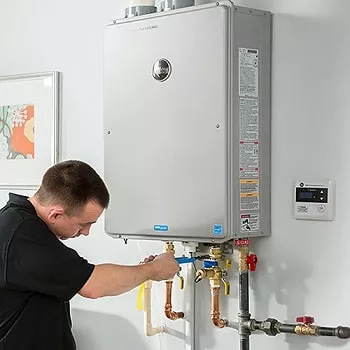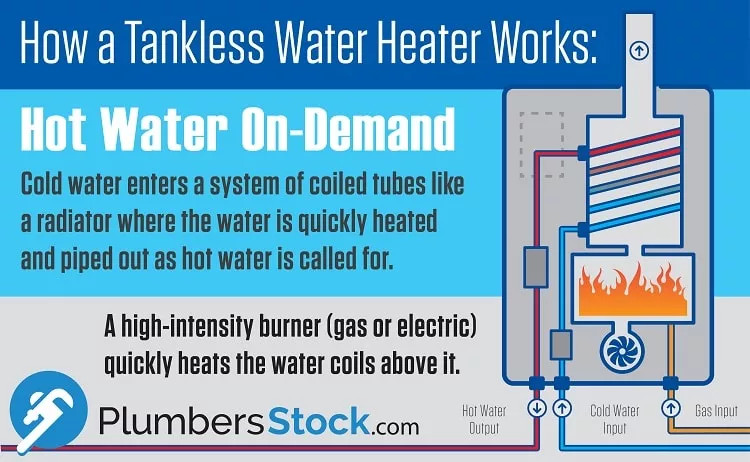
Innovative tankless water heaters, also called on-demand water heaters, are an excellent option for many homeowners. When planning for a new purchase, you should understand how they work and how they might save you money on utility bills, so let's get to it: how does a tankless water heater work? It's a reasonably uncomplicated process, but the results are powerful! Before we get into how they work, let's answer an important question:
What Is a Tankless Water Heater?
Traditionally, homeowners have installed tank water heaters where stored water is heated. The water remains in the tank until the occupants of the home need it. A tankless water heater is a solution that does not utilize a tank or stored water. It heats water only when needed, on demand.
Despite the variations in fuel type, all tankless water heaters work roughly the same. Remember that on-demand water heaters have an optimal flow rate that produces the hottest water. Many of today's on-demand Water heaters can make a 70-degree temperature rise with a flow rate of 1.5 GPM. However, the more water you demand from your heater, the lower the water temperature output.
How On-Demand Water Heaters Work in 3 Steps
Plainly stated:
- Cold water goes in.
- The water is heated by coils (which are fueled by natural gas, propane, or electricity).
- Hot water comes out.

These units use high-powered burners to heat your water on demand. The water quickly runs through the heat exchanger and comes out of your shower or faucet piping hot. The benefit is that you won't waste energy on the standby heat loss you experience with traditional water heaters. Regardless of what fuel type you install, you will want to calculate your flow rate to determine your required specifications. So if you plan to run your dishwasher and shower off the same heater simultaneously, add their two flow rates together to get an idea.
Types of Tankless Water Heaters
- Natural Gas - natural gas is probably the most common fuel type.
- Propane - remember that many units can be modified with conversion kits. You can convert from natural gas to propane.
- Electric - initially not very cost-effective for most homeowners, but times are changing.
Gas-Fueled
According to Consumer Reports, the average home will save between $70-80 (annually) by installing a gas on-demand water heater. Keep in mind that if this is the ideal setup for you, you'll probably save a lot more than that. This will vary depending on your habits, so keep that in mind as you purchase. You could be the beneficiary of much more savings, or you might not benefit that much. For example, the demands of larger families tend to put a strain on tankless water heaters. A traditional water heater may be more efficient if you have multiple loads of laundry, dishes, and frequent bathing.

Tankless Water Heater Venting
Whenever dealing with gas and fire within a home, you need a solution for venting. This is one of the significant advantages of installing a tankless unit compared to a traditional tank. Traditional units must be vented through the roof, whereas on-demand water heaters give you the flexibility to vent through the wall and the roof.
There are two basic types: direct vents and power vents. Direct pulls from the outside air allow you to put a tankless unit in tighter spaces. Power venting requires a larger area to allow enough air for combustion.
There is such a thing as a condensing tankless water heater, which is much more efficient than its counterparts. The exhaust is cold enough to vent them with PVC pipe instead of metal pipes, which are more costly to install.
Electric
One strong consideration you need to make is how much electricity a tankless unit will require. This problem becomes more prominent when you have cold groundwater. Your home may require multiple units or a high-capacity unit. Check out our tankless vs. tank water heater comparison for more information.
What Is a Point of Use Tankless Water Heater?
As the name suggests, this is an on-demand water heater dedicated to a single room or a section of a home. Say you have a master bathroom on the opposite end of the house from the water heater. You might be dealing with cold water for a whole minute before the hot water finally starts coming through. A point-of-use (POU) water heater is a game-changer in cases like this.
There is such a thing as a storage tank POU water heater, but we recommend tankless because they are so compact in comparison. If space is not an issue, maybe a tank is right for you.
Choose from Trusted Brands
If you want a tankless water heater built to last, go with a trusted name. At PlumbersStock, we carry reputable manufacturers like Bradford White, Noritz, and Takagi. Please contact us if you have any remaining questions about how on-demand water heaters work or anything related to water heaters.
Related resources:
Are Tankless Water Heaters Worth It?
How Long Do Tankless Water Heaters Last?
Tankless vs. Tank Water Heater (Infographic)
Tankless Water Heater Sizing



